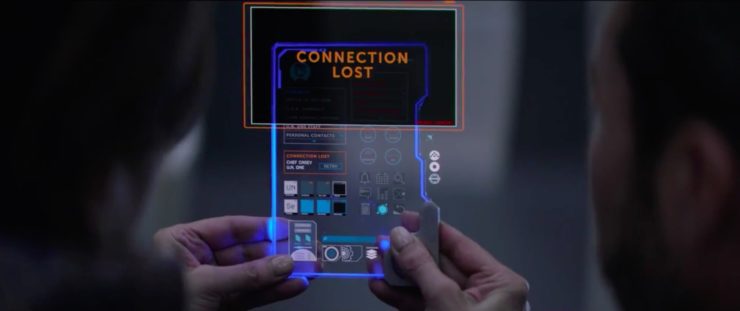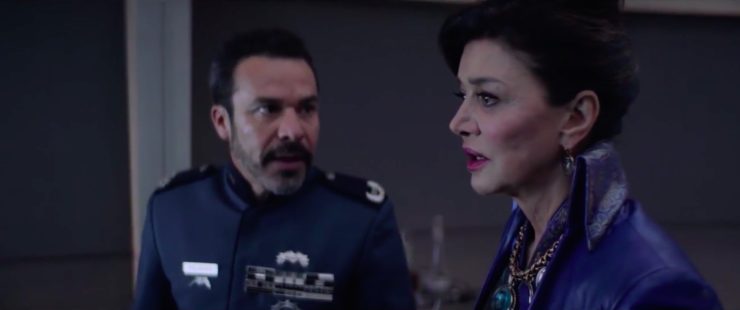On first watch, this episode is a tense system-wide train wreck. On second watch, it made me cry twice. Brace for impact.
Spoilers for episode 4, “Gaugamela,” absolutely follow.
Bobbie and Alex don’t get a lot of screen time this week, but they open the episode with a meaningful conversation about trauma, grief, “emotional stamina,” and facing the hardest things with open eyes. It’s also about the things we do to survive the hard moments and what comes after them, and when Bobbie said, “When you come out the other side of this, you’re going to want to be doing something that matters,” I felt it a lot more heavily than any writer could’ve imagined a viewer would.
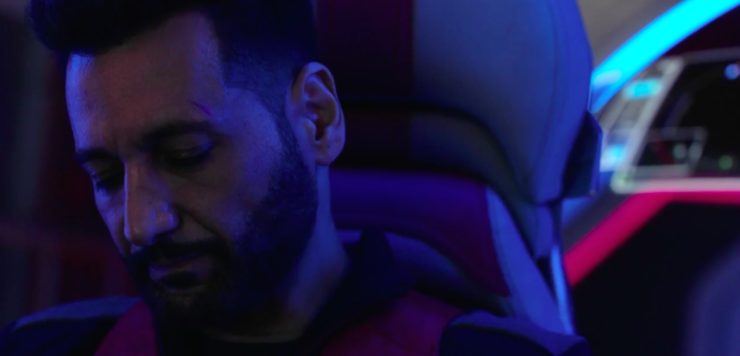
They’re how we first learn the details of the attack on Earth, when they get an emergency alert. Along with the massive blast on our planet, there’s been an explosion at the Martian parliament.
We Expanse fans should be used to disaster by now. There’s so much of it in this show, from Eros to Ilus, from the Cant to Marco spacing Ashford. But we’re still Earthers, and it’s still disconcerting to watch it quite literally hit home. Everything is fiction here—except the planet we’re walking on.
I wasn’t sure at the end of last season what I thought about showing Marco’s hand so early, but it’s worked incredibly well to let us in on everything—to make us sit with that knowledge, and watch Avasarala piece it together, and grow furious along with her when no one will listen. Every action, every choice, is precisely built on the choices that went before it. Avasarala knows she burned her bridges, but that doesn’t make this her fault any more than it’s Nancy Gao’s fault. They both inherited broken systems and centuries of Inner bigotry toward the Belt. They’ve both done terrible things, or probably have (remember the Belter interrogation way back in the first season? The way they used Earth’s gravity against a human being?). But you can condemn the mistakes of the Inners and be horrified by Marco’s actions and the millions of lives he just wiped out. To create any kind of change, they need to be able to hold those truths together, to accept them both, and to figure out what better world might come next.
But we’re still in the immediate aftermath, on screen. The news reaches our far-flung crew in different ways, and it’s worst for the man on the ground. Clearly Avasarala had no trouble setting up Amos’s visit to Clarissa “Peaches” Mao, who currently resides in the bowels of a terrifying underground prison.
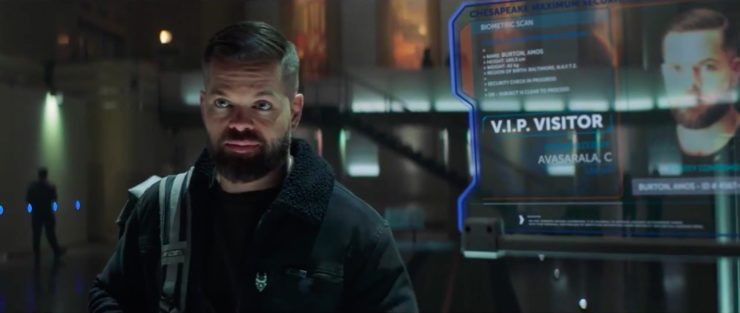
The last we saw of Clarissa was last season, when Alex talked to her while he was on the the way to Ilus. In season 3, Julie Mao’s sister tried to destroy Holden in retaliation for what happened to her father (who was brought down by his own greed, but sure, Holden kind of played a part in that). Anna stopped her from killing Naomi, and in the end Clarissa helped save the day. But she was still a murderer, and the Roci took her back to Earth to face trial.
The conversation Amos and Peaches have in season 4 is a heavy one: She thanks him for letting her work alongside him on the trip back to Earth, and he acknowledges that at one point on that trip, he gave her the opportunity to kill herself. “If I was staring down a lifetime sentence, I’d wanna have the option.” Clarissa didn’t feel like she deserved the “easy” way out, but Amos doesn’t really believe in “deserving,” and gives her his survival credo:
“You breathe in. You breathe out. Eat, shit, sleep. You take whatever they give you, and you give nothing in return.”
Buy the Book
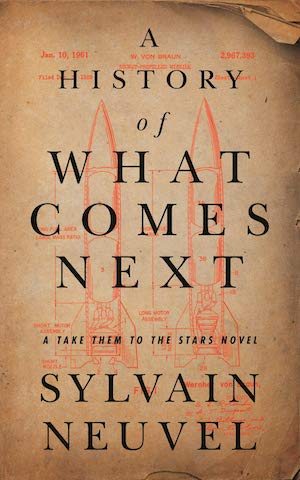

A History of What Comes Next
When Amos tells Clarissa this, he sounds impassioned. It’s not his usual distance. Something in him recognizes something in her, and I think it’s partly that she also doesn’t know how to steer herself. What to aim for, how to be, what a person is like. He knows that, and he knows that he can help.
And Clarissa takes that credo deeply to heart. When she says it back to him in “Gaugamela,” it’s the only moment when she seems fully awake. She burns when she says it, and it’s like Amos is really hearing those words—the austerity of them, the way they frame a limited existence—for the first time. This is what he taught her, and maybe it wasn’t the right thing. He can hardly look at her when he asks, “Do you want me to leave?”
But Clarissa doesn’t mean it as an indictment. It’s what’s gotten her this far. Amos meant those words as a kindness, in the way he understands kindness—the way he learned from Lydia, who he invokes when he says:
“People like us. The things we do? It’s not just on us. This world is messed up, and it can mess you up. I was lucky. I had somebody that helped me.”
It’s not just Lydia, though. It’s also Naomi. It’s also Holden. It’s everyone who made room for Amos to be who he is, even when who he is isn’t easy. What he did for Clarissa on the Roci was the same: he made space for her, not just in spite of who and how she is, but because of those things. Clarissa is still holding onto the idea that what she did was too terrible, that she can’t be helped. She doesn’t really understand yet that Amos’s morality doesn’t work that way. He may not have a nuanced sense of right and wrong, but he does have his own moral compass.
And now he has mortal danger, too. That crack cannot be good.
Meanwhile, in space… where do I start? With Avasarala, frantic and furious, using truly her every connection to finally make Nancy Gao listen? (“I know who I fucking called!”) With the horror and terror of Avasarala and Delgado watching their feed as Gao’s plane is knocked out of the sky? It’s an agonizing scene, but with one sliver of comfort: at least Gao’s orders to retask the watchtowers went out before that rock hit.
The moment when Delgado says “I know I didn’t fight hard enough” is crushing. You could look at this devastation as partly his fault; if he’d pushed and pushed, maybe someone would’ve listened, but maybe they wouldn’t. Maybe it would’ve meant that Gao hung up the minute Avasarala got through to her. He can’t know, and that will haunt him. But he and Avasarala get one of the rare moments of grace in this exhausting, breathless episode: when they join everyone in the Luna bar just in time to watch Earth’s defense network destroy the next rock. Writer Dan Nowak, who did an incredible job with this complicated and crushing story, wisely left that moment wordless: everything we need is in their faces, in that complex mix of relief and regret.
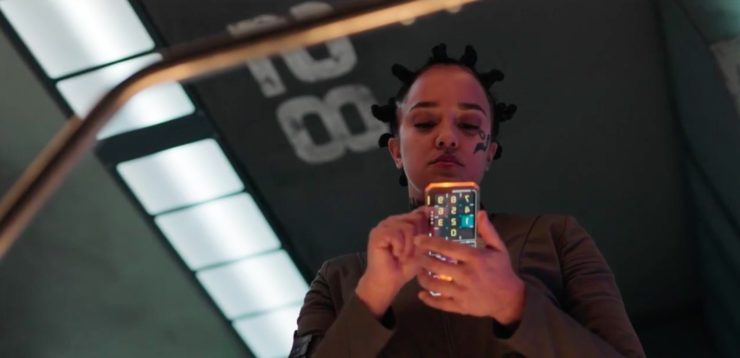
On Tycho, shit has also gone sideways. Fred, Bull, and Holden thought they’d set a trap for whoever had kidnapped Monica, but the trap was already closing around them. Everything they did, their enemy had planned for—because their enemy was Sakai. Conniving, friendly, with the power to lock everyone out of the station’s systems: she plays them good. Monica’s kidnapping slowed the journalist down so she couldn’t uncover the full protomolecule plot, but there’s something more here: Sakai tells a colleague, “We take her with us” about Monica. Why does Marco (presumably) need a journalist? His own propaganda machine?
I didn’t see Fred’s death coming here. It seems impossible that after everything this man has survived, he dies by three shots in the back. He did deserve to finish what he was building. But he’s gone, and Holden is left with the remnants of the clash on Tycho, a lost protomolecule sample, and one thing that’s driving me batty with tension: Sakai was in charge of fixing up his entire ship. Absolutely nothing about the Roci can be trusted.
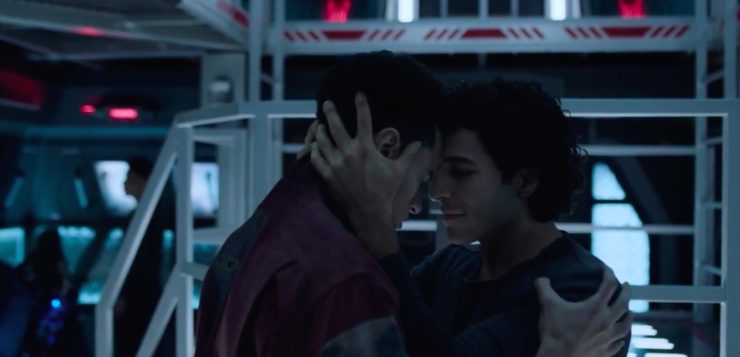
Poor Naomi is so far from her ship, too, enduring the worst family reunion. Marco’s petty cruelties know no bounds, from mocking Filip’s choice to kidnap his mother as the actions of a needy child to the way he gleefully surprises Naomi with the news of the asteroids smashing into Earth. Naomi, more than anyone, sees through the speechifying, the big talk, to the heart of Marco’s desires: to watch his enemies burn. He has made Filip complicit in mass murder on an incomprehensible scale, but all he sees is his victory.
There’s a lot I can’t argue with in Marco’s slippery speech: the way humans are taking generations, centuries, of cruelties across the stars and into new worlds. The subjugation of the Belters. The arrogance of the Inner Planets. On the one hand, why should their realms extend past their atmospheres? On the other, why should the Belt have sole claim on the ring worlds? Why should anyone? Even as Marco claims he wants to end humanity’s cycles of violence and colonization, subjugation and oppression, he wants to continue exactly the same things—just on his own terms. Which are still violence, death, and hurting those who hurt you.
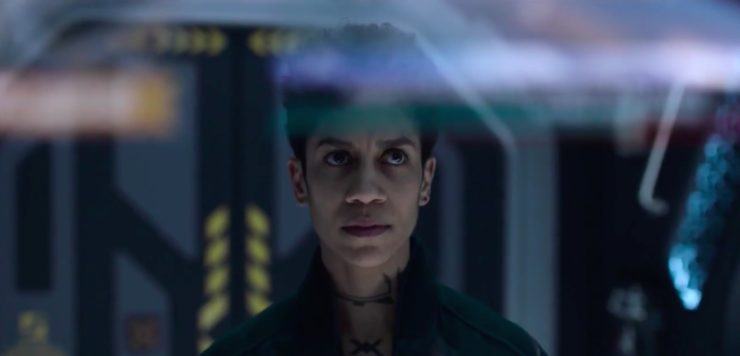
“Gaugamela” refers to the battle that led to the fall of the Achaemenid Empire, when Alexander the Great defeated the Persian army of Darius III despite being outnumbered. In “Churn,” Sauveterre quoted a different Persian, Xerxes: “Great things are achieved by embracing great dangers.”
If you search for this, you’ll find a slightly different version that has nothing to do with danger (but leave it to a Martian to make it tougher): “Only by great risks can great results be achieved.” I am truly no historian, so please feel free to correct me on this, but: I find it fascinating that Wikipedia will tell you right up front that Xerxes I “is notable in Western history for his failed invasion of Greece in 480 BC.” Sauveterre, then, is engaging in a classic human habit: cherry-picking what we would like to learn from the past.
BOOK NOTES FOR BOOK NERDS
So. Fred Johnson. He had a lot left to do, you know? One of this episode’s direct shots to the gut was the image of his bloody comm unit floating as Marco’s message filled the airwaves (Spacewaves? Sorry, I don’t know how their space phones are supposed to work.) In Nemesis Games, Dawes gets word to Fred of Sakai’s treachery before the engineer can act—but a coup still erupts on the station just as they learn of the asteroid attacks. The protomolecule still gets stolen (in the same way, with a salvage mech), and to this point, the results are the same.
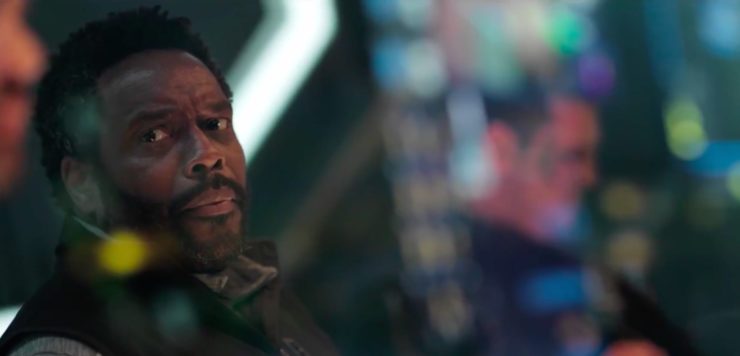
But Fred’s death now, rather than when it occurs in the books, could change the story going forward, and this is where I’m going to go to whiteout lest anyone get spoiled. Don’t highlight if you haven’t read Nemesis Games and Babylon’s Ashes!
It’s Fred who gets word that Medina Station has gone dark, and it’s Fred who suggests to Holden that Marco Inaros may not be the top of the command chain—that he’s not really smart enough to have pulled off what he’s done on his own: “He’s not a first-class mind, and this is a first-class operation.” Who else knows Marco well enough to float this theory? Only Naomi, I think, is close enough to know his habits, his capabilities, and it would be interesting to let her develop that theory—if we’re going to get into it at all. Fred isn’t necessary, exactly, for what’s to come, but I’m very curious how the show’s narrative will reshape itself around his absence.
FLOTSAM & JETSAM
- The Razorback—which belongs to Bobbie now—has a new name! Say hello to the Screaming Firehawk.
- The detail on Avasarala’s outfits is always gorgeous, but look how close her blue is to Delgado’s military uniform. This visual reminder that they’re deeply in this together is so good.
- “I repeat: Go fuck yourself.”
- Holden! DO NOT SHOOT AT THE PROTOMOLECULE AAAAAAGH.
- I did not expect Monica Stuart, absolute badass, but wow she’s growing on me.
- Chrisjen’s call to Arjun is just heartbreaking.
- Rock tally: Three hits, one destroyed in space, three destroyed by the watchtowers. We know there were at least nine. Two seem to be unaccounted for.
Molly Templeton lives and writes in Oregon, and spends as much time as possible in the woods. You can also find her on Twitter.










